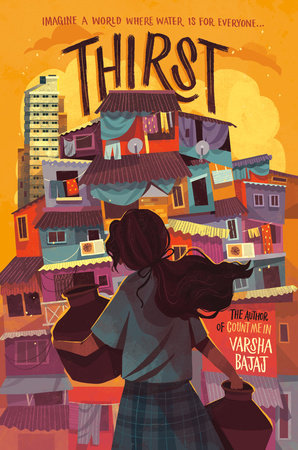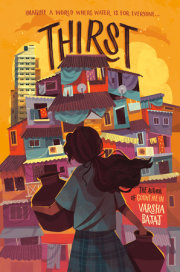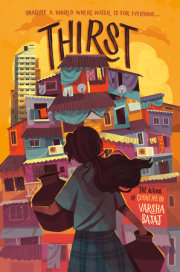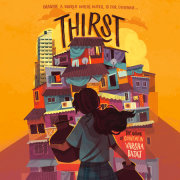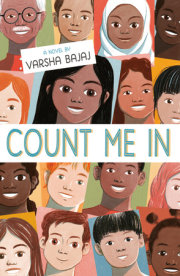1 Sanjay and I sit on the top of the hill and stare out at the huge, never-ending Arabian Sea. The salty breeze brings a little relief from the heat.
“It feels like the world is made of water from up here,” I say. “That there’s enough of it for everyone.”
But I know there isn’t.
In the distance, the flyover bridge soars into the sky and snakes across the bay. Its lights twinkle and outshine the stars in the night sky.
“The sea link bridge looks like an
M,” I say. “It does,” my brother says. “
M for Mumbai?”
“
M for me—Minni,” I say. “And for Monsoon. I hope this year we have a good one.” Lately the monsoon season comes later and later, which means less and less water.
Although water surrounds my island city, most of the people I know are always struggling to get enough. We don’t have running water in our house. We just have a tap outside that we share with our neighbors. Ma has to wake up at the crack of dawn to fill our buckets because the authorities only supply water for two hours every morning and for an hour in the evening when the shortages aren’t too bad. The rest of the day, the tap is dry. Every home has a big barrel outside the house, to store collected water for the day.
“Remember when Ma and the other women draped our leaky old tap with a marigold garland as if it was a god they could charm with flowers?” Sanjay says.
I do remember, and we laugh, although it’s sad to think it was probably a frustrating day when the water trickled rather than flowed.
I look out at the ocean. Part of our view is blocked by billboards with glamorous Bollywood movie stars—billboards that are larger than our house.
The houses in our neighborhood are small and crammed on top of each other, but they do face the sea. Rich people who live in skyscrapers pay millions for the same ocean view. Last year, a charity helped paint our homes and fix our leaking tin roofs. Some said it was because the people whizzing past in their air-conditioned cars on the flyover bridge didn’t want to see decaying, moldy “slums.”
I chose yellow for our house. I helped to sand down the years of moss and mold from our old tin and concrete walls. Baba, Ma, Sanjay, and I dipped our brushes in yellow, and the first coat of paint was like a ray of bright sunshine getting rid of the darkness. My neighbors chose purple and blue, and red and orange. Our street looks like a rainbow.
“Sanjay,” I ask, “will we have to worry about water when we are grown up?”
For a long moment, he is silent.
So I answer myself. “No. No, we won’t.”
I point at the cluster of tall buildings shimmering in the distance where Ma works in the afternoons. I say, “One day, we’ll live in one of those tall shiny buildings, where water runs from taps.”
“Okay,” he says, and links his arm in mine, as if I’m predicting the future. “Like the boy who was born here and studied computers and now has an office in a building and employs sixty people.”
I nod.
“Can you imagine,” I say, “that on top of some of those high-rise buildings they have a swimming pool full of water? Enough for our whole neighborhood to bathe. How do you think they built a pool on top of a building? Wouldn’t you love to see it?”
Sanjay laughs. “You and your questions!”
“Well, they are awfully lucky to have so much water to spare . . .”
“Minni,” he says, “I wish there was a way to make all this seawater drinkable. Then there’d be enough for us all.”
“There is a way!” I say. “Our teacher told us it’s possible—she said it’s called desalination. But it’s expensive, and you need a huge factory to strain the salt out.”
“Look how smart you are,” he says. “You will live in a fancy building!”
“You too,” I say.
Sanjay is fifteen, and after he graduated from tenth grade last year, he got a job in a restaurant. He dreams of being a chef, but for now he does food prep. It’s good he likes what he’s doing, because we didn’t have money for college anyway.
I dream for him too. Chef Sanjay.
I pretend to be a palmist and study both our hands. “Could I be like Meena Aunty?” I ask.
“Why not? Knowing you, you can do anything you set your mind on doing,” he says. “And plus you’re even named after Ma’s sister.”
“Like her, I will finish school and get a good job,” I wish aloud.
“Hmmm, Minni Meow, banker,” he says, teasing me with my childhood nickname. “But I think I see you more as a scientist.”
“That’d be cool—or maybe a builder,” I say dreamily. “I bet those high-rise roofs don’t leak like ours after the monsoon. Wouldn’t it be great if ours didn’t? And if they didn’t get so hot?”
We head home as the sun starts to dip. There is a line for the water tap on the main street. Water pressure must be weak today. When it doesn’t get through the web of makeshift hoses, people must line up at the main source. The water line snakes around the block, and we hear the sounds of insults being hurled and see some men shoving one another. There are shrieks. Women scatter. Angry noises fill my ears.
Another fight’s breaking out.
We don’t wait to see what happens. Sanjay grabs my hand, and we turn around and away from the scene and find our way home through alleys and side streets. My heart thumps along with my running feet.
Our father has told us a million times over the years,
If you invite trouble, it will come. It will stay for chai and for dinner. We definitely don’t want to invite trouble.
2 Ma makes the most delicious daal in the world, and my father has eaten two bowls of it. “I might make the best tea and pakodas, but your ma is the greatest at everything else,” he says, and sighs in contentment.
Ma blushes whenever Baba praises her cooking.
Ma’s potatoes melt in your mouth too, and I’ve saved a few for the last bite of my meal. Sanjay’s right hand hovers over my plate, and I slap it away.
“Minni Meow won’t even give me a potato!” he says dramatically.
“Ma,” I complain, “tell him to stop calling me that—I’m not five anymore.”
But I can’t help giggling and give him the bite anyway. I’ve never been able to resist his goofy ways.
We’re seated on the floor in the center of our living space. Curtains separate this from our parents’ sleeping area, and Sanjay and I sleep up in a small loft. Never-ending sounds of honking horns and smells of cooking food and the citronella that keeps away mosquitoes fill the air in our home.
“Something happened today in the water line, and there was another fight,” my father tells us. Baba runs a tea shop named Jai Ho, which means “victory.” It’s where everybody in our neighborhood hangs out, so he hears everything that goes on.
Sanjay and I exchange a look because we know a little too well what Baba is talking about.
We don’t mention it because our father also believes in the proverb illustrated by the three monkeys—one with his hands over his eyes, the second with them over his ears, and the third covering his mouth—symbolizing “See no evil, hear no evil, and say no evil.”
Ma kisses her Ganesh locket. “I hope no one got hurt.”
“The water pressure is too low already,” Baba says.
“Someone said they might have to order a water tanker. That usually doesn’t happen till May.”
Ma looks worried. Buying water means money. Money that we don’t have.
Then she pulls a flyer from her bag. “This was on the bulletin board at the clinic.”
Baba’s sitting back in his worn-out wicker chair, but now he straightens up, alert. “Why were you at the clinic?”
“That’s not important,” she says.
“Yes, it is,” Sanjay and I say together.
“My stomach hurt,” Ma says. “So I went to see the new doctor, but the line was too long, so I couldn’t wait.”
I had noticed that Ma didn’t seem to have much of an appetite lately.
“It’s probably nothing. A little bug probably, like last year. Remember the doctor said we should
always boil our water,” she says.
“We almost always do,” Sanjay says. “Are you feeling better?”
“I feel tired, but I’m okay. Now forget about me. I’m glad I went, because otherwise I might not have heard about the computer class,” says Ma.
What? Computer class!
My eyes are wide. The small room suddenly feels spacious. It’s as if the word
computer, spoken aloud, has magically created windows in the walls where none existed.
Baba, who is usually a quiet listener, has so many questions. Who is running the class? Where will it be held and when? Who decides who’ll get in? What will they teach?
Then Sanjay asks the important question: “Ma, how much does it cost?”
The room shrinks down to size again. Money: It rules everything.
“I don’t know,” says Ma, “but before leaving for work tomorrow, I will go back and find out.”
Ma works hard. Every day, she cooks and cleans not only for our family, but also for a family that lives in one of the expensive high-rise buildings not far from where we live.
“One of my friends said her son learned computers right after school and got a job in a big office.” Ma tousles Sanjay’s hair. “Maybe our Sanjay could get a job like that.”
“It will be Minni,” Sanjay says. “She’s the smart one. She’s always first in her class. Plus I’ve got a job already.”
“Perhaps you both will,” says Ma.
Sanjay is downcast whenever Ma dreams of him getting another job. She doesn’t believe in his chef dream like me. I wish she did.
“You’ll be a star chef on TV with your own show, Sanjay,” I say. “And I’ll be in the audience and clap the loudest. They’ll name dishes after you. Sanjay’s bhindi masala.”
Baba laughs affectionately at me. “Minni and her dreams,” he says.
Ma jumps up, a big smile on her face. “I almost forgot. I have a surprise. Pinky gave me a mango. An Alphonso mango.”
“Those are so expensive!” I say.
“Yes, they are,” says Ma. “And the season has barely started.”
Ma takes the mango out of her cloth bag and places it on a plate. It isn’t overripe. It doesn’t have any black or brown spots. It’s golden yellow, with streaks of red. Firm to the touch and perfectly ripe, shaped like a kidney. The mango gleams.
Three pairs of eyes turn toward Ma. We need to know more.
Ma giggles like a schoolgirl. Her smile lifts her cheekbones. “Pinky’s hair was all in tangles, and it hurt too much when her mother tried to comb it, so I offered to help.”
Pinky is the daughter of the family Ma works for, and she’s about my age.
I imagine Ma’s gentle hand combing through Pinky’s hair and braiding it like she does mine.
“And for that she gave you an Alphonso mango?” Sanjay says.
Mama laughs. “You didn’t hear how loud Pinky was yelling at her mom. Anita Ma’am said Pinky was giving her a headache.”
Ma cuts the juicy fruit into four portions. I notice Ma’s portion is smaller than the others, and Sanjay’s is just a bit bigger than mine.
“Ma,” Sanjay says, “you should comb Pinky’s hair every day through the mango season.”
“I would do it anytime,” Ma says. “Pinky is a sweet girl. And Anita Ma’am’s always been good to us, even paying Minni’s school fees this year.”
I stop mid-bite. “You never told me that,” I say.
“I didn’t? It was back in December when I needed to send some money to your grandmother and was worried about being able to pay your fees. She offered.”
I wrestle with this knowledge. What would we have done if Ma’s boss hadn’t offered? Would I have been sent to the free government-run school instead of my current school, which is run by an educational charity? How could Ma not tell me something that important? It’s troubling to think my future was in the hands of someone else and I didn’t even know.
Copyright © 2022 by Varsha Bajaj. All rights reserved. No part of this excerpt may be reproduced or reprinted without permission in writing from the publisher.

